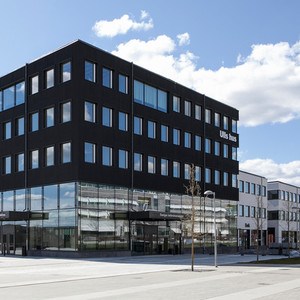Contact
Environmental coordinator University administration
Linda Ferngren, phone number +46738227982

For environmental work purposes, the university administration, university management and the library count as one and the same. Here you can read more about the local environmental management work being conducted by each unit.
More details about SLU’s comprehensive environmental work are available under Administrative support – environment. Here you can access SLU’s Environmental Handbook that contains information about the procedures and other documents that apply to all activities and organisations at the university. You can also read SLU’s overall environmental objectives and follow-ups and a wealth of other interesting information.
At SLU Ultuna, we want to minimise the negative environmental impact of business travel and make it easier to cycle to and from work. Read more about SLU Campus Ultuna – the bike-friendly workplace.
By the end of 2025, the fuel used by the Forestry and Agricultural Operations Unit's (LBD) for vehicles and boilers will be 100 per cent fossil-free.
Annual follow-up: The Ultuna and Hallfreda estates already use HVO100 and the Lanna estate currently uses a mix of 50 per cent fossil-free and 50 per cent fossil fuel. This means that approximately 70 per cent of the fuel used by forestry and agricultural operations is fossil-free. No changes were made during 2023 due to the high fuel prices. ![]()
As of 2023, procurements will include a requirement for fossil-free fuel for vehicles where possible.
Annual follow-up: The procured forest managers will be using 100 per cent HVO100 in the forests and a minimum of 50 per cent HVO on the roads, with the agreement having entered into force on 1 January 2022. There are additional requirements stipulating the use of HVO100 to the greatest extent possible. However, this is currently a matter of cost and an internal issue, as academia is not always able to pay for fuels that are more expensive. ![]()
By the end of 2025, the Forestry and Agricultural Operations Unit's (LBD) will have introduced 10 new measures aimed at optimising the use of and/or reducing the leakage of plant nutrients.
Annual follow-up: Twenty-two actions were planned during 2023 and the majority were implemented. There are 23 measures in total. ![]()
By the end of 2025, the Forestry and Agricultural Operations Unit's (LBD), in cooperation with academia, will have implemented 5 field trial or test results to evaluate different plant protection measures and shared the results with active farmers. ![]()
Annual follow-up: Twelve implementations were planned and performed in 2023.
By the end of 2025, all estates will have implemented measures from the Svenskt Sigill list of biodiversity measures covering at least 2 per cent of the estate’s arable land.
Annual follow-up: Together, the four estates will implement measures over at least 44 hectares of the 2 227 in use. Measures covering more than 170 hectares were planned during 2023 and the majority were implemented. ![]()
By the end of 2025, all estates will have implemented measures, corresponding to at least one (1) measure per 10 hectares, to support insects, pollinators and birds on and around arable land.
Annual follow-up: Together, the four estates will implement at least 223 measures. In 2023, 334 measures were planned, of which 330 were implemented.![]()
Linda Ferngren, Division of Infrastructure and Division of Real Estate Management
Daniel Albertsson, SLU University Library, Alnarp
Therése Aspén, Division of Financial Administration
Mårten Granert-Gärdfeldt, Division of Communication
Jürg Brendan Logue, SLU University Library, Ultuna
Ylva Lönnerholm, Division of Educational Affairs
Alexandra Nikolic, LTV Faculty Office
Yenny Venegas, Academic Conferences
Anna Wallander, Division of IT
Markus Wikborg, Division of Human Resources
Anna-Klara Lindeborg, Vice-Chancellor's Office
If you have any suggestions about how to reduce SLU’s environmental impact – or if you wish to draw attention to something that does not conform to SLU’s procedures – you can submit a report via SLU’s reporting system, IA.
Non-conformities and improvement proposals are important in order to identify what does not work or what can be improved within the operation to fulfil the continual improvement requirement in ISO 14001. Non-conformities are requirements that have not been fulfilled. This applies to requirements at all levels within the operation, i.e. instructions, objectives and policy. For example, a non-conformity can be that an instruction is not followed or that employees do not work according to an adopted policy.
NB: When reporting an environment-related issue, select Environment in under the What? drop-down menu. A second drop-down menu will appear below: Underhändelsetyp [Event] where you can select either Avvikelse [Non-conformity] or Förbättringsförslag [Improvement proposal].
Environmental coordinator University administration
Linda Ferngren, phone number +46738227982